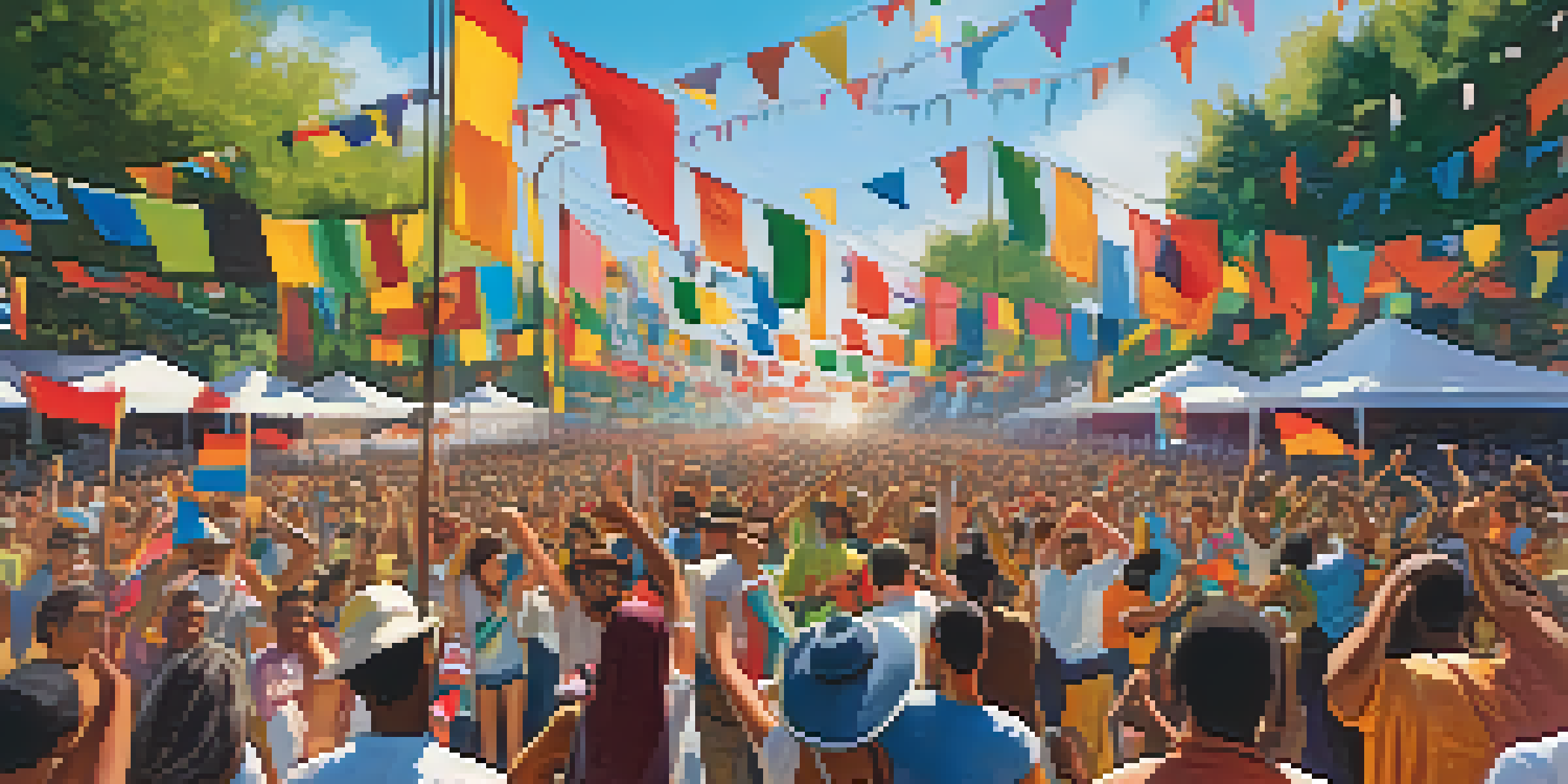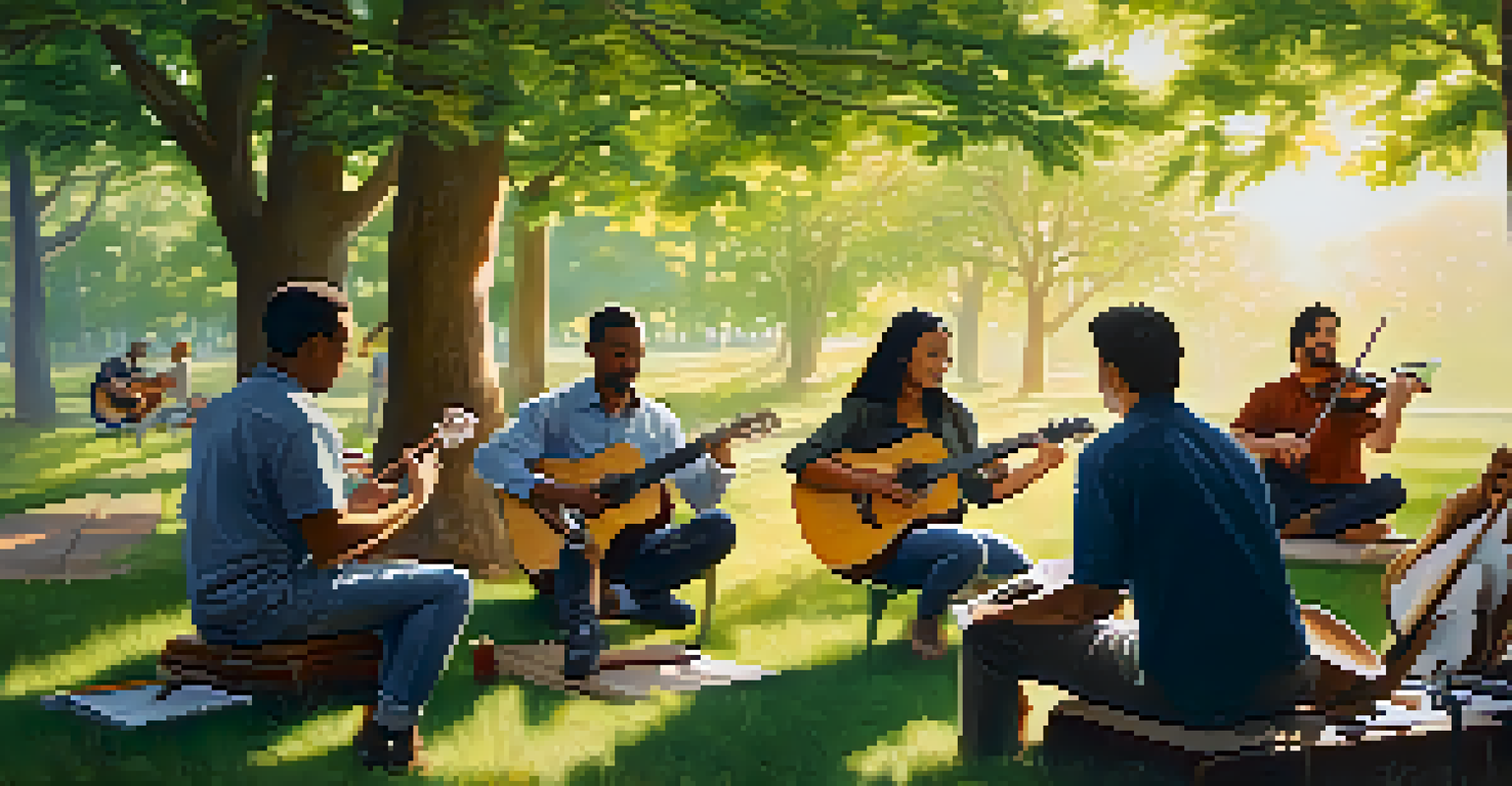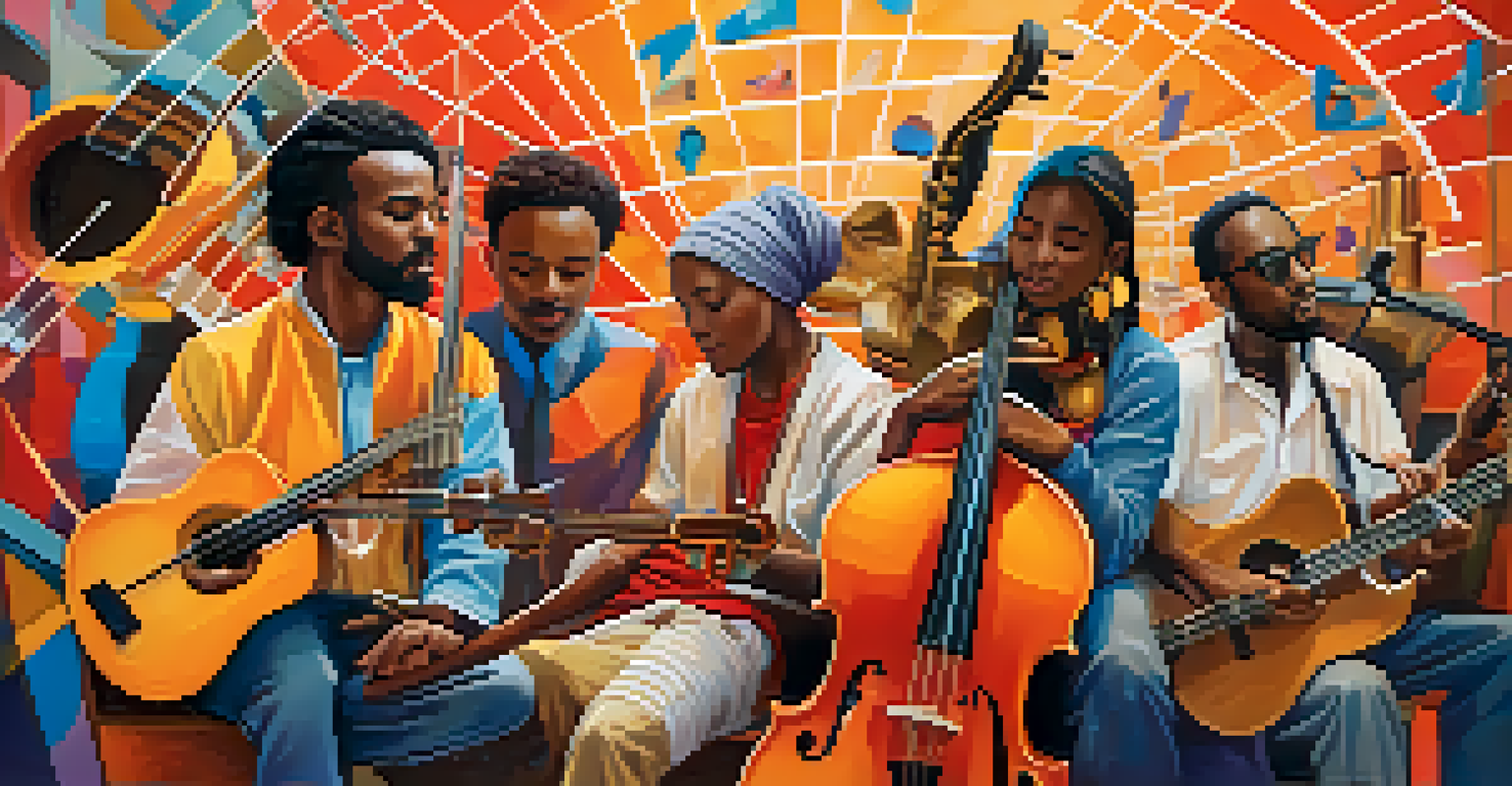Global Music Collaboration for Peace: Case Studies

The Power of Music as a Universal Language
Music transcends borders and cultures, serving as a universal language that connects people. It has the unique ability to evoke emotions and create bonds, making it an ideal medium for promoting peace. In times of conflict, music can foster understanding and empathy, bridging divides that words often cannot.
Music can change the world because it can change people.
For instance, the global success of various music festivals showcases how diverse artists come together to share their love for music, creating a sense of unity. These events often feature collaborations among musicians from different backgrounds, demonstrating that shared passions can lead to collaborative efforts for peace.
Moreover, initiatives like 'Music for Peace' leverage this power by organizing concerts and events where artists perform together, sending a collective message of hope and harmony. Such efforts highlight the potential of music to not just entertain, but also to inspire positive change.
Case Study: Playing for Change
Playing for Change is a remarkable initiative that brings together musicians from around the world to create music for social change. The project began with the simple idea of connecting artists through music, regardless of their geographical locations. By filming performances in various countries, they create a tapestry of sound that reflects diverse cultures.

One of their most famous songs, 'Stand by Me', features musicians from multiple continents, showcasing the beauty of collaboration. This not only highlights the shared human experience but also amplifies the message of peace and unity. The resulting music videos have garnered millions of views, spreading awareness and inspiring others to join the cause.
Music Connects People Worldwide
Music serves as a universal language that transcends cultures, fostering understanding and empathy among diverse communities.
Through their efforts, Playing for Change has funded music schools and programs in underprivileged communities, proving that music can be a catalyst for education and empowerment. This case study exemplifies how global music collaboration can effectively promote peace and social change.
Case Study: OneBeat Program
OneBeat is an innovative program that brings together young musicians from around the world for collaboration and cultural exchange. The initiative emphasizes the role of music in diplomacy, offering artists an opportunity to create original compositions that address social issues. Through workshops and collaborative performances, participants learn from each other while sharing their unique musical traditions.
Where words fail, music speaks.
An example of their impact can be seen in the creation of songs that tackle topics like climate change and social justice. By combining different musical styles and perspectives, artists produce powerful messages that resonate across borders. These compositions serve not only as artistic expressions but also as tools for raising awareness.
Moreover, OneBeat encourages participants to take their new skills back to their communities, empowering them to use music as a force for good. This ongoing ripple effect illustrates how music can unite individuals and spark conversations that lead to meaningful change.
Case Study: Music and Refugee Integration
Music has played a vital role in integrating refugees into new communities, fostering connections through shared experiences. Programs like 'Musicians without Borders' focus on using music as a means to bring together displaced individuals and local residents. These initiatives provide a safe space for expression and creativity, allowing participants to share their stories through song.
One memorable example is a project in Germany that brought together Syrian and local musicians to create a collaborative album. This not only facilitated cultural exchange but also helped break down stereotypes and build understanding between different communities. The music produced served as a testament to resilience and hope in the face of adversity.
Collaborative Initiatives for Peace
Programs like Playing for Change and OneBeat demonstrate how musical collaboration can drive social change and promote peace.
Through such efforts, music becomes a bridge that connects people from diverse backgrounds, highlighting our shared humanity. By fostering dialogue and collaboration, these programs contribute to a more inclusive society, demonstrating the power of music as a tool for peace.
The Role of Technology in Music Collaboration
In today's digital age, technology plays a pivotal role in facilitating global music collaboration. Platforms like social media and streaming services allow artists to connect and share their work with audiences worldwide. This accessibility has opened up new avenues for collaboration, enabling musicians to work together across vast distances.
For example, virtual concerts and online jam sessions have become popular ways for artists to collaborate, especially during times when travel is restricted. These digital gatherings not only keep the spirit of collaboration alive but also reach audiences who might not have access to live performances. They showcase the resilience of the music community in adapting to challenges.
Additionally, technology enables the creation of collaborative projects like 'Global Jukebox', where musicians from different cultures contribute to a single track. Such initiatives highlight the endless possibilities that arise when artists unite through technology, ultimately reinforcing the message of peace and solidarity.
Music Festivals as Platforms for Peace Initiatives
Music festivals often serve as powerful platforms for peace initiatives, bringing together diverse audiences and artists. Events like the 'Glastonbury Festival' and 'Woodstock' have historically highlighted social issues and encouraged activism through music. These gatherings create a sense of community among attendees, fostering conversations about peace and understanding.
At festivals, artists often use their performances to advocate for social justice and humanitarian causes. For instance, many musicians dedicate their sets to raising awareness about global issues, inspiring fans to take action. The electrifying atmosphere of live music can amplify these messages, creating an impactful experience for all involved.
Technology Enhances Music Collaboration
Digital platforms enable artists to collaborate globally, creating impactful projects that spread messages of peace and solidarity.
Moreover, festivals can provide funding for charitable organizations, ensuring that the message of peace resonates long after the music fades. By leveraging the collective energy of their audiences, music festivals can effectively promote initiatives that contribute to a more peaceful world.
The Future of Music Collaboration for Peace
Looking ahead, the future of music collaboration for peace seems promising, thanks to an increasing awareness of global issues. Artists are more inclined than ever to use their platforms to address social justice, climate change, and other pressing concerns through their music. This shift creates opportunities for innovative collaborations that transcend borders.
As movements like 'Black Lives Matter' and 'Fridays for Future' gain momentum, musicians are stepping up to amplify these voices. Collaborations that blend genres and cultures can create powerful anthems for change, inspiring listeners to engage in their communities. The potential for music to unite people in the pursuit of peace is greater than ever.

Finally, with technology continuing to evolve, the possibilities for collaboration are boundless. Artists can connect with one another and their fans in real-time, creating a global community dedicated to promoting peace through music. The future holds the potential for even more impactful projects that harness the power of collaboration to foster a more harmonious world.